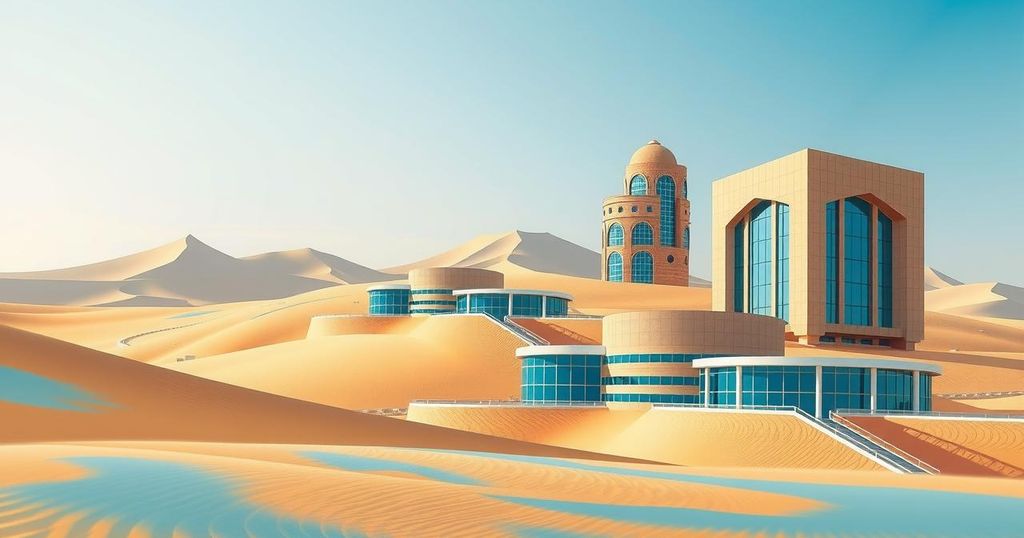Saudi Arabia’s Diplomatic Transformation: From Pariah to Power Broker

Saudi Arabia is hosting a summit with key global leaders, including U.S. Secretary of State Marco Rubio and Ukrainian President Volodymyr Zelenskyy, while attempting to reshape its international image from a pariah to a diplomatic powerhouse. Despite some reforms, concerns regarding its human rights record persist. Crown Prince Mohammed bin Salman is a central figure in these efforts as the kingdom engages in global mediating roles and diversifies its economy.
Saudi Arabia is positioning itself as a key mediator in global conflicts, with an important summit scheduled for Tuesday. This summit will feature U.S. Secretary of State Marco Rubio and Ukrainian President Volodymyr Zelenskyy, who is working to repair relations with the United States after past tensions. Saudi Arabia has significantly enhanced its reputation as a diplomatic facilitator, engaging in various global discussions, including initiatives related to the Ukraine war and the future of Gaza.
In past years, prominent political figures, including President Joe Biden, labeled Saudi Arabia a “pariah.” Despite some recent reforms, human rights organizations continue to critique the kingdom’s poor record in this regard. The talks in Jeddah illustrate Crown Prince Mohammed bin Salman’s (MBS) efforts to reshape Saudi Arabia’s international image from a conservative theocracy to a diplomatic and cultural hub.
Experts observe that Saudi Arabia is becoming a more influential actor on the global stage. Thomas Lippman from the Middle East Institute remarked that the nation is now more visible, educated, and open-minded compared to the past. Crown Prince Mohammed bin Salman is central to this transformation, which includes courting international relationships across various sectors, including business and entertainment.
Recent developments reflect the complexity of U.S.-Saudi relations; Trump recently announced a planned visit to Saudi Arabia, echoing his first term’s visit. This relationship raises concerns about potential conflicts of interest arising from significant investments by Saudi Arabia into Trump-affiliated ventures. Senator Ron Wyden has pointed out potential conflicts with regards to investments linked to Trump’s family.
Saudi Arabia’s efforts to establish itself beyond the influence of the U.S. extend to peace negotiations on global matters, including recent talks involving the U.S. and Russia. The kingdom seeks to become a venue for international diplomacy, competing with traditional locations such as Geneva. Alongside its diplomatic ventures, Saudi Arabia is progressing with its Vision 2030 initiative aimed at diversifying its economy beyond oil dependence.
The kingdom’s cultural landscape is also changing, with increased entertainment events and investments in sports, notably through its controversial LIV golf tour. Following its G20 summit in 2020, Saudi Arabia has developed a more assertive diplomatic style, balancing relations with major powers like the U.S. and China while also emphasizing its developmental potential.
While President Biden’s approach to Saudi Arabia evolved, with a recent visit to meet Crown Prince Mohammed, significant past issues, such as the Khashoggi killing, remain unresolved. Reforms in the kingdom have introduced some changes, such as women’s rights advancements, although significant human rights challenges persist according to the State Department.
Despite some contemporary improvements noted by observers like Rayan Alyusufi, Saudi Arabia still faces serious human rights criticisms. A recent report highlighted ongoing abuses, including unlawful killings and repression of dissent. The Saudi Embassy’s response to inquiries regarding these allegations was not immediately available. As global dynamics shift, many view Saudi Arabia as a complex international player that requires engagement, notwithstanding its troubled domestic policies.
In conclusion, Saudi Arabia is actively seeking to redefine its role on the international stage, moving from a historically criticized status to that of a diplomatic powerhouse. Despite ongoing human rights issues, the kingdom’s emergence as a mediator in global conflicts and its efforts to reshape its image are noteworthy. Driven by Crown Prince Mohammed bin Salman, Saudi Arabia’s strategic initiatives reflect a broader ambition to engage with the world, whilst navigating complex political landscapes and relationships, particularly with the United States.
Original Source: www.nbcnews.com








